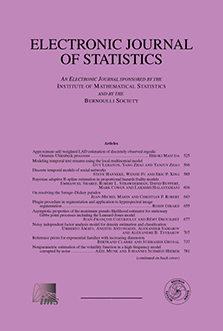Abstract
In statistical research there usually exists a choice between structurally simpler or more complex models. We argue that, even if a more complex, locally stationary time series model were true, then a simple, stationary time series model may be advantageous to work with under parameter uncertainty. We present a new model choice methodology, where one of two competing approaches is chosen based on its empirical, finite-sample performance with respect to prediction, in a manner that ensures interpretability. A rigorous, theoretical analysis of the procedure is provided. As an important side result we prove, for possibly diverging model order, that the localised Yule-Walker estimator is strongly, uniformly consistent under local stationarity. An R package, forecastSNSTS, is provided and used to apply the methodology to financial and meteorological data in empirical examples. We further provide an extensive simulation study and discuss when it is preferable to base forecasts on the more volatile time-varying estimates and when it is advantageous to forecast as if the data were from a stationary process, even though they might not be.
Citation
Tobias Kley. Philip Preuß. Piotr Fryzlewicz. "Predictive, finite-sample model choice for time series under stationarity and non-stationarity." Electron. J. Statist. 13 (2) 3710 - 3774, 2019. https://doi.org/10.1214/19-EJS1606
Information





